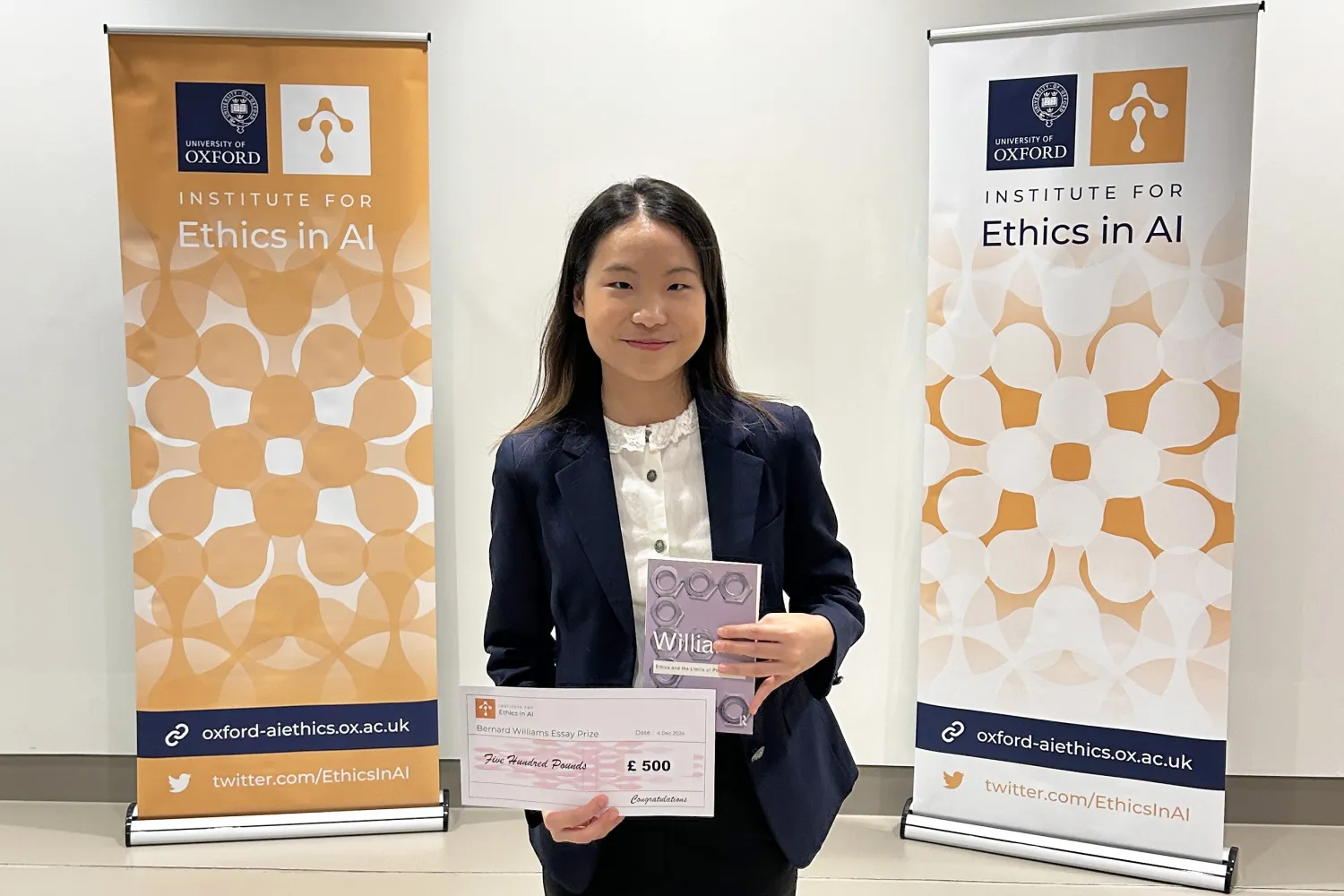Breadcrumb
Xiaolan Deng wins 2024 Bernard Williams Essay Prize
Xiaolan Deng, a second-year student of Computer Science and Philosophy at Christ Church, has been announced as this year’s winner of the Bernard Williams Essay Prize, awarded by the University of Oxford’s Institute for Ethics in AI. This year, the essay competition’s participants were asked to tackle the complex question: ‘Is AI a threat to human creativity?’
The rapid development of artificially intelligent systems, the proliferation of their applications, and their growing use by governments, institutions and businesses raise many urgent questions of ethics and governance. What impact could such systems have on human rights, democracy, social cohesion and the environment? How should the use of AI be regulated to protect against potential harms? Part of the mission of Oxford’s Institute for Ethics in AI is to bring the greatest minds in academic philosophy, the humanities, business and government to bear on such matters, and to support these experts as they endeavour to keep pace with technological change.
As well as catalysing the research of today’s experts in the ethics and governance of AI, the Institute seeks to champion and encourage the thinkers of the future. To this end, it provides graduate scholarships and an annual essay competition on the ethics of AI for undergraduate students of philosophy at Oxford, the Bernard Williams Essay Prize, named after one of the most influential moral philosophers of the 20th century. This year’s question on the implications of AI for human creativity garnered more than 100 submissions, and Christ Church’s Xiaolan Deng was selected as the winner – a remarkable achievement.
‘Encouraged by my tutors, Dr Fabian Pregel and Dr Irwin Zaid, I decided to prepare the essay during the summer vacation. It was both a challenge and an opportunity for me to integrate my technical understanding of AI with my philosophical reasoning and writing skills that I have learned from my degree,’ Xiaolan said.
Winning the prize means a lot to me – this recognition motivates me to keep pursuing my passion for the intersection between technology and philosophy.
Winning the prize means a lot to me – this recognition motivates me to keep pursuing my passion for the intersection between technology and philosophy.
Xiaolan’s essay, entitled ‘Original Creativity, Associative Creativity, and AI’, makes the case that AI can pose a severe threat to human creativity – not through direct replacement, but by transforming the way in which we produce and perceive creative works. To mount her core argument, Xiaolan first draws a distinction between two kinds of creativity, which she dubs ‘original’ and ‘associative’ creativity.
Original creativity is the production of something entirely new, a groundbreaking idea or work that transcends conventional thinking and logic. ‘This kind of creativity is often revolutionary, as seen in Albert Einstein’s Annus Mirabilis papers that redefine fundamental concepts of space, time, mass, and energy in modern science,’ Xiaolan explains. In contrast, associative creativity consists in the ability to make connections between existing ideas in novel ways.
Generative AI excels at associative creativity. By analysing vast amounts of data, AI can identify patterns and connections that may not be immediately obvious to humans. However, Xiaolan argues, AI lacks two necessary conditions for exhibiting original creativity – uniqueness and intentionality (the property of being ‘of’, ‘about’ or representing things) – conditions AI fails to meet in virtue of lacking subjective properties of experience that philosophers call ‘qualia’.
But why does it matter if AI systems lack original creativity? ‘The real threat AI poses to human creativity’, Xiaolan claims, ‘lies not in its ability to replace human creators, but in how it redefines the creative process.’ Traditionally, human creativity originates from within – ideas, emotions and subjective experiences are shaped into concrete works of art, music, or writing. ‘AI, however, approaches creativity from the opposite direction’ – that is, it relies entirely on associative creativity to produce outputs without original intention, leaving full interpretation to the audience.
The issue then, as Xiaolan sees it, is this: if people cannot reliably differentiate between human-made and AI-generated art, the original creativity behind a work may lose relevance. ‘This shift could change how we value creativity – no longer focusing on the originating process, but rather on the final product and how we, as observers, interpret it.’
Xiaolan’s novel argument greatly impressed the team at the Institute for Ethics in AI, and at the award ceremony on 4 December she was asked to present her celebrated essay to a diverse audience of academics, students, and AI enthusiasts. ‘It was an incredible experience to discuss my ideas in such a stimulating environment’, Xiaolan said. ‘I felt both honoured and humbled to be awarded the first prize and a £500 award.’
Xiaolan thanked her tutors at Christ Church Dr Fabian Pregel and Dr Irwin Zaid, both of whom joined her for the award ceremony: ‘This achievement would not have been possible without the guidance and encouragement I’ve received at Christ Church. Winning the prize means a lot to me – this recognition motivates me to keep pursuing my passion for the intersection between technology and philosophy.’
Other Christ Church news



